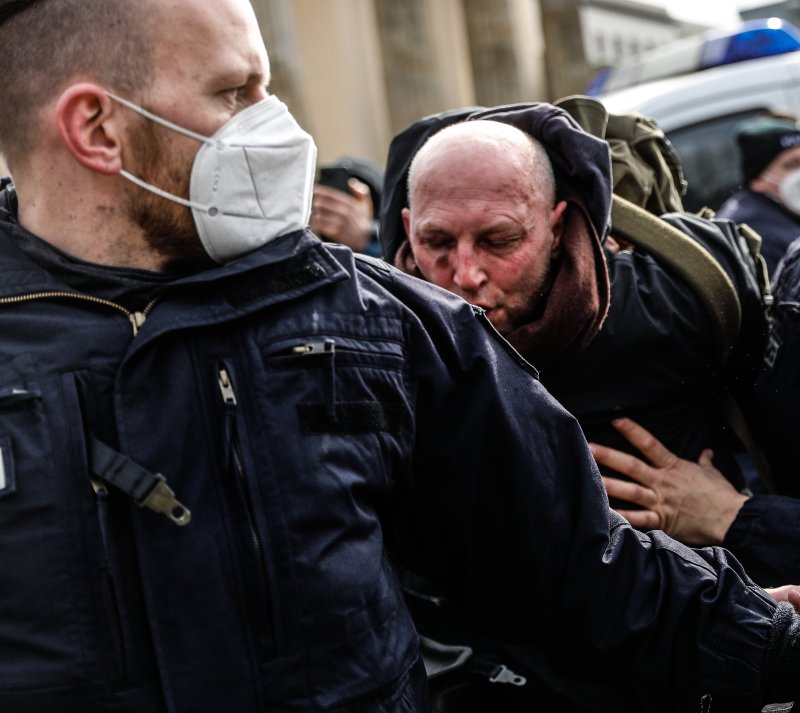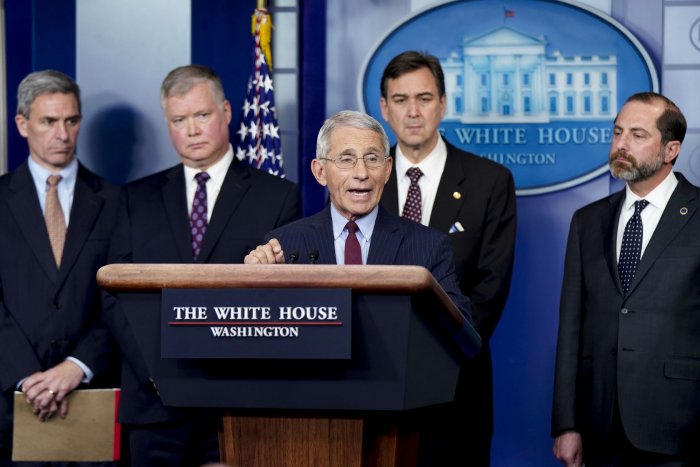Police detain a right-wing protester Saturday during a rally in Berlin. Photo by Filip Singer/EPA-EFE
March 20 (UPI) -- Thousands protested COVID-19 restrictions across Germany on Saturday despite surge in cases.
Police estimated 10,000 demonstrators engaged in protests in the central city of Kassel after the court overturned the city's demonstration ban amid the third wave of the pandemic across Europe and rallies in various other cities, Deutsche Welle reported.
Several protesters, most of whom weren't wearing masks, according to DW, chanted the "Wir sind das Volk ("We are the people") slogan of the peaceful protests that triggered the end of communist East Germany in 1989.
Police in Hessen, Germany, tweeted that they used water cannons at the intersection of of Altmarkt to disperse protesters after demonstrators attempted to break police barriers and threw bottles at them.
The police added they were able to prevent the breach of the barriers.
Police also warned they would disperse the crowd if they refused to obey COVID-19 restrictions such as wearing masks and social distancing.
In Berlin, protesters -- described by the Berlin Spectator as right-wing extremists -- clashed with police after they ordered them to abide by COVID-19 rules to wear masks and social distance, leading to several arrests.
Experts consider such protests super-spreader events, citing two protests in November leading to a sharp increase in cases across Germany, according to ZEW economic institute in Mannheim.
The protests came as Germany reported more than 16,000 new cases Saturday, the Robert Koch Institute daily COVID-19 dashboard shows.
There have been more than 2.6 million infections and 74,643 deaths in the country since the pandemic began, according to Johns Hopkins University global tracker.
Health Minister Jens Spahn warned Friday that vaccinations would not be enough to contain the COVID-19 variants spread and rise in cases, and restrictions that had been lifted may have to be reimposed, The Evening Standard reported.
"The rising case numbers mean that we cannot take further opening steps in the weeks to come," Spahn told The Evening Standard. "On the contrary, we may even have to take steps backwards."
The rollout of the AstraZeneca vaccine was halted across Europe over reports of blood clotting, but vaccination campaigns resumed Thursday after regulators found the benefits outweigh the risks.
In France, Paris and northern parts of the country have entered new partial lockdown measures amid the surge with its origins attributed to the more virulent, British variant of COVID-19, CNBC reported.
The partial lockdown, which took effect from midnight Friday, means people will be allowed to exercise outdoors, and essential shops and schools will remain open, but non-essential businesses are shut, according to the BBC.
France's seven-day average of new COVID-19 cases rose above 25,000 this week for the first time since November, Johns Hopkins University figures show.
The country has reported more than 4.2 million cases and 91,843 deaths since the pandemic began.
Poland also reimposed a lockdown due to a surge in COVID-19 infections, the BBC reported. The partial lockdown has shut down non-essential shops, hotels, cultural and sporting facilities for three weeks.
Similar to France, Poland has reported its highest new daily rates of the coronavirus since November, Johns Hopkins University data shows. Poland has reported 25,998 new cases in the last 24 hours.
Since the pandemic began, Poland has reported more than 2 million cases and 49,159 deaths, according to the global tracker.
In Britain, the government has laid out a roadmap to gradually ease restrictions, which includes reopening of non-essential businesses after April 12, and easing social distancing limits through June.
On Thursday, Prime Minister Boris Johnson said the roadmap will not be impacted by delays in vaccine supplies.
Johnson received his first Oxford/AstraZeneca vaccine dose Friday. The dose was administered at St. Thomas' Hospital where he was treated in the intensive care unit when he became ill with the virus last year.
More than 39% of the British population has received a first dose of vaccine and 3% are fully vaccinated, the Bloomberg COVID-19 tracker shows.
Britain has reported more than 4.3 million cases and 126,359 deaths since the pandemic began.
In Pakistan, Prime Minister Imran Khan and first lady Bushra Bibi tested positive for COVID-19, the premier's health aide, Dr. Faisal Sultan announced. The couple were self isolating at home after their diagnoses.
The Ministry of National Health Services said Khan tested positive days after receiving his first of two vaccine doses.
"He only got the first dose ... merely two days ago, which is too soon for any vaccine to become effect," the ministry tweeted. "Antibodies develop two to three weeks after the second dose of two-dose COVID vaccines," the ministry said.
Studies have shown that the Pfizer and AstraZeneca two-dose vaccines provide some level protection after the first dose, but it typically takes longer than two days to establish immunity.
Pakistan reported 3,876 new cases and 42 deaths for Friday, and has had a cumulative 623,135 cases and 13,799 deaths since the start of the pandemic, according to Johns Hopkins.
India reported 40,953 new cases in the last 24 hours, its biggest spike since Nov. 29, prompting some states to reconsider lockdown measures such as school closures and public gathering limits, NDTV reported.
Since the pandemic began, India has reported 11.5 million cases and 159,558 deaths.
India has the third-highest number of cases of any country worldwide, trailing only Brazil and the United States, which have 11.8 million and 29.7 million case,s respectively. Worldwide, COVID-19 has infected over 122 million people and killed over 2.7 million people.
January 31, 2020
National Institutes of Health official Dr. Anthony Fauci (C) speaks about the coronavirus during a press briefing at the White House in Washington, D.C. Health and Human Services Secretary Alexander Azar (L) announced that the United States is declaring the virus a public health emergency and issued a federal quarantine order of 14 days for 195 Americans. Photo by Leigh Vogel/UPI |
License Photo
















